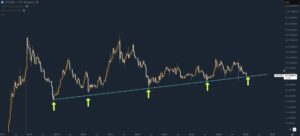The crypto industry and regulators need time to collaborate on crypto rules that do not stifle innovation and increase financial inclusion without risking a cascade of unintended consequences.
In brief
- Circle CEO Jeremy Allaire warned US regulators against over-regulating crypto
- The CEO believes the industry needs 1-2 years to establish proper guidelines
- Heavy-handed Stablecoin regulation might stifle innovation and the USD’s global reach

The CEO and co-founder of peer-to-peer USDC payments firm Circle, Jeremy Allaire, sent a letter to the senior staff of the United States Treasury Department on December 9th appealing for regulators to collaborate with the industry with regards to crypto regulations.
Allaire cautioned against a heavy-handed approach from US regulators as it would pose a direct risk to the country’s competitiveness and could even trigger a cascade of unintended consequences around crypto and blockchain-related use cases.
Specifically, the executive referred to a new proposal that would prohibit so-called unhosted or self-hosted wallets, which refer to self-custody of cryptocurrencies such as bitcoin and ethereum.
Allaire argued that the proposal does not address actual risks in the industry:
“I believe the proposal would inadequately address the actual risks that are at issue, would significantly harm industry and American competitiveness, would continue to yield economic and industry advantage to Chinese firms, and would have significant unintended consequences around the broader use-cases for this technology.”
The CEO also said that both regulators and industry participants were still early and needed some time to figure out best practice guidelines in an emerging technology together.
Allaire noted: “the industry needs time, probably 1-2 years, to put these kinds of technologies in place,” he said, “Not only does the industry need this time, but this will allow the industry and financial regulators to collaborate together on building the rule sets and supervisory schemes that make sense in this new world.”
Allaire is joined by several members of the US Congress including representatives Warren Davidson and Tom Emmer, both of whom opposed the rumoured ban on self-custody wallets in an official letter to the Treasury on December 9th.
The Circle founder joins several members of Congress including representatives Warren Davidson and Tom Emmer, who opposed the rumored ban on self-hosted crypto wallets in an official letter to the Treasury on Dec. 9.
Some crypto advocates have stated that they are not sure what a “self-hosted wallet” means. “I don’t even know what a self-hosted wallet is. I only know ‘not my keys,’ and ‘my keys,’” Blockstream’s Samson Mow said on Dec. 9.
Buying bitcoin? Start here.
A war on stablecoins?
The rumours circulated shortly after a proposed bill that would force stablecoins to abide by banking regulations was put forward on December 4th.
The bill was met with widespread condemnation from all sectors of the cryptocurrency community, who fully criticised the legislation that would disregard bitcoin and crypto’s potential to ‘financialise’ people who would otherwise remain unbanked.
Stablecoin market capitalisation has grown considerably this year, with USD Tether (USDT) leading the surge in growth at $20 billion in market cap. USD Coin (USDC) is second to the top stablecoin by usage and market cap at $3.08 billion per data from Cryptoslate.
A regulatory blow to stablecoins could have a cascading effect on the bitcoin and cryptocurrency markets as a whole given their widespread and increasing usage in the industry by both futures and spot exchanges.
Read More: Ray Dalio admist bitcoin is an ‘interesting alternative to gold’
Bitcoin advocates such as Samson Mow also questioned the meaning of a so-called ‘self-hosted wallet’, stating: “I don’t even know what a self-hosted wallet is. I only know ‘not my keys,’ and ‘my keys’.
For now, industry participants can rest easy but sooner or later regulators might change their attitude, especially if (and when) the industry becomes more ‘material‘ in its consequences, as Ray Dalio noted about bitcoin last week.
Subscribe to the semi-weekly newsletter for regular insight into bitcoin and crypto. Go on. It’s free.
Join the telegram channel for updates, charts, ideas and deals.
Did you like the article? Share it!


